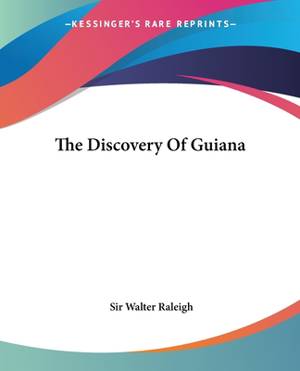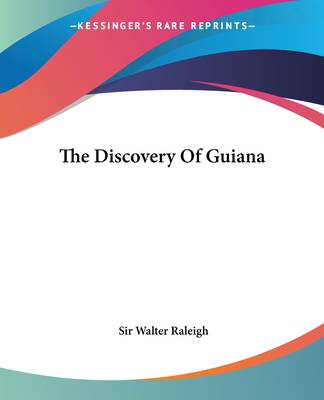
- Afhalen na 1 uur in een winkel met voorraad
- Gratis thuislevering in België vanaf € 30
- Ruim aanbod met 7 miljoen producten
- Afhalen na 1 uur in een winkel met voorraad
- Gratis thuislevering in België vanaf € 30
- Ruim aanbod met 7 miljoen producten
Zoeken
Omschrijving
""The Discovery of Guiana"" is a historical book written by Sir Walter Raleigh, an English explorer, soldier, and writer. The book describes Raleigh's journey to the South American country of Guiana in search of the legendary city of El Dorado, a city supposedly made of gold. The book is a first-hand account of Raleigh's experiences in Guiana, including his interactions with the local indigenous people and his discovery of the Orinoco River. It also provides a detailed description of the natural resources and wildlife of the region, as well as the political and social structure of the indigenous tribes. Raleigh's account is considered an important historical document as it sheds light on the early exploration and colonization of the Americas by European powers. The book is written in a vivid and engaging style, making it a fascinating read for anyone interested in history, exploration, or adventure.This island of Trinidad hath the form of a sheephook, and is but narrow; the north part is very mountainous; the soil is very excellent, and will bear sugar, ginger, or any other commodity that the Indies yield. It hath store of deer, wild porks, fruit, fish, and fowl; it hath also for bread sufficient maize, cassavi, and of those roots and fruits which are common everywhere in the West Indies.This scarce antiquarian book is a facsimile reprint of the old original and may contain some imperfections such as library marks and notations. Because we believe this work is culturally important, we have made it available as part of our commitment for protecting, preserving, and promoting the world's literature in affordable, high quality, modern editions, that are true to their original work.
Specificaties
Betrokkenen
- Auteur(s):
- Uitgeverij:
Inhoud
- Aantal bladzijden:
- 72
- Taal:
- Engels
Eigenschappen
- Productcode (EAN):
- 9781419159862
- Verschijningsdatum:
- 17/06/2004
- Uitvoering:
- Paperback
- Formaat:
- Trade paperback (VS)
- Afmetingen:
- 191 mm x 226 mm
- Gewicht:
- 140 g

Alleen bij Standaard Boekhandel
+ 54 punten op je klantenkaart van Standaard Boekhandel
Beoordelingen
We publiceren alleen reviews die voldoen aan de voorwaarden voor reviews. Bekijk onze voorwaarden voor reviews.








